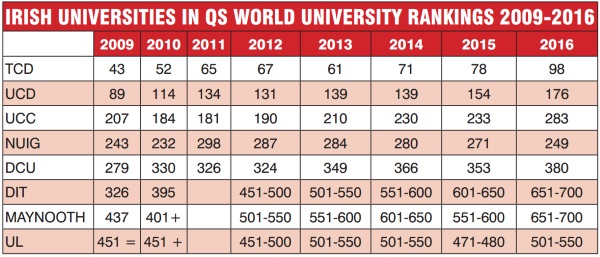Update 3pm: The fall in QS World University Rankings for all except one Irish university is due to budget cuts, rising student numbers and high student-teacher ratios, according to the Union of Students in Ireland (USI).
The USI said that State funding has been cut by a third from €1.4bn to €923m since 2008, and staff numbers have fallen from over 9,000 to below 8,000 while student numbers have increased by nearly 40,000 to more than 190,000.
They also said that there has been a “huge rise” in temporary or contract work with a government-commissioned report by senior counsel Michael Cush finding that up to two-thirds of lecturing staff in some higher education institutions are not full-time or permanent.
Annie Hoey, USI President, said: “Student numbers have increased by 18% and the rise of zero-hour contracts to employ academic staff doesn’t encourage or attract people to the profession.
“This has a negative effect on the quality of the teaching, the quality of the learning and the quality of the institutions.”
USI proposed a €500 minimum reduction in fees, a €140m investment in higher education and a reinstatement of postgraduate grants in its pre-Budget submission.
Ms Hoey said: “The reinstatement of the postgraduate grants will cost €53 million.
“USI’s proposal for the Government to reverse cuts to student grants made in the 2011 Budget and the 2012 Budget will cost €12.3m. The minimum reduction of the student contribution charge by €500 will cost €34m per €500.”

Update 9.30am: The education sector is starting to crack at the edges according to the Union of Students in Ireland.
USI President Annie Hoey was speaking as new ranks showed all but one of our universities slipping down international rankings.
The USI’s pre-budget submission calls for a €140m investment in third level education.
They are also looking for a €500 reduction in registration fees and a reversal of cuts to student grants.
Ms Hoey said the education sector badly needed investment.
“The sector has been running at maximum capacity,” she said. “Budgets have been cut right, left and centre. Student numbers have increased by 18% and the student-teacher ratios are nearly going obscene.
“Obviously, the institutions themselves are really starting to crack at the edges.”

Earlier:
All of Ireland’s universities, bar one, have slipped down the international rankings.
The new rankings show that, while four Irish universities remain in the top 300, Trinity College Dublin (TCD) has barely stayed in the top 100 and University College Dublin (UCD) is down 22 places to 176th.
Other than NUI Galway – the only one to make gains in the 2016 QS World University Rankings – all Irish universities have fallen substantially since 2009 due largely to funding and staff cuts.
Massachusetts Institute of Technology (MIT) tops the QS rankings for a fifth successive year.
In an unprecedented statement, the presidents of TCD and UCD are calling for the Government and opposition parties to implement the Cassells report. Published by Education Minister Richard Bruton in July, it said an extra €600m a year must be spent on higher education by 2021, rising to €1bn by 2030.
The sector has seen annual State funding cut by one third from €1.4bn to €923m since 2008, and academic staff fall from over 9,000 to below 8,000. In the same period, third-level student numbers have increased by nearly 40,000 to over 190,000.
However, no Government decision on how the funding gap should be bridged will be made until the Cassells report is debated by the Oireachtas Education Committee this autumn.
TCD provost Patrick Prendergast and UCD president Andrew Deeks said the political system must now make the difficult choices needed to improve higher education funding and how it is distributed.
“A significant start has to be made in the forthcoming budget to signal that the Government is serious about investing in our young people and providing them with the skills needed to survive and thrive in an increasingly competitive global environment,” they said.
“The future of the country depends on it.”

Among the biggest drop is University College Cork’s 50-place fall from 233 to 283rd, and now trailing NUI Galway. UCC was in the top 200 from 2010 to 2012, reaching 181st in 2011.
Maynooth University is now ranked between 650 and 700, after being in the 550-600 banding a year ago and the top 450 in 2010.
The QS World University Rankings show NUI Galway has moved up 22 places to 249th in the world.
The chart of more than 4,000 third level institutions puts M.I.T. in Boston at number one, followed by Stanford and Harvard.
NUIG president Dr Jim Browne said its international reach was being advanced by rising international student numbers, and collaborations with an array of industry partners, facilitated by high-calibre research and teaching.
Dublin Institute of Technology is also included in the QS rankings, and it drops from the 601-650 band to the next lowest, 651-700.
Michael Murphy, president of University College Cork, said the country no longer has the luxury to postpone political decisions on bridging the funding shortfall to the sector.
“The genie is out of the bottle, despite our efforts to put a brave face on it. The realities are now coming out in repeated ranking outcomes,” said Dr Murphy.
UCC was 181st in the QS rankings in 2011 but Dr Murphy said the loss of 12% of senior science and medical academics has had a big impact because of the importance attached in rankings to research.
This article first appeared in the Irish Examiner, by Education Correspondent Niall Murray


